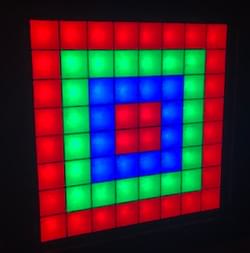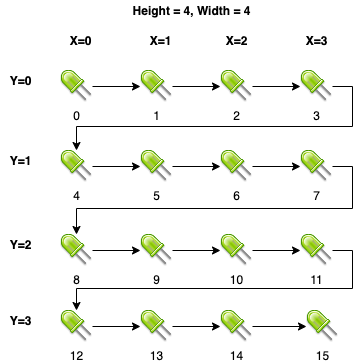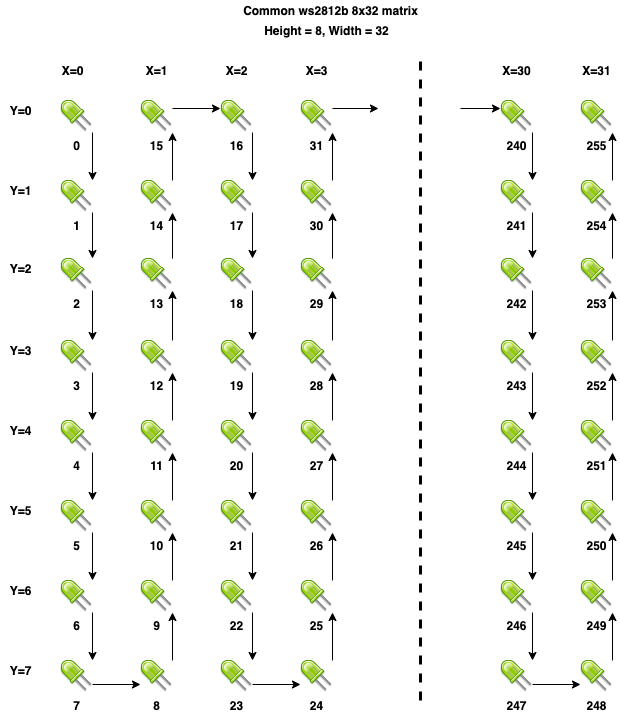Addressable Light
The addressable_light display platform allows to display text and graphics on an addressable
light that has been arranged in a display matrix.
The display requires that an AddressableLight component, such as FastLED Light or NeoPixelBus Light, be defined.

display:
- platform: addressable_light
id: led_matrix_display
addressable_light_id: led_matrix_light
width: 8
height: 8
rotation: 180°
update_interval: 16ms
lambda: |-
// Draw a bulls-eye pattern
Color red = Color(0xFF0000);
Color green = Color(0x00FF00);
Color blue = Color(0x0000FF);
it.rectangle(0, 0, 8, 8, red);
it.rectangle(1, 1, 6, 6, green);
it.rectangle(2, 2, 4, 4, blue);
it.rectangle(3, 3, 2, 2, red);Configuration variables
addressable_light_id (Required, ID): The id of the addressable light component to use as a display.
width (Required, int): The width of the LED matrix in pixels.
height (Required, int): The height of the LED matrix in pixels.
rotation (Optional): Set the rotation of the display. Everything you draw in
lambda:will be rotated by this option. One of0°(default),90°,180°,270°.update_interval (Optional, Time): The interval to call the lambda to update the display. Defaults to
16ms.pixel_mapper (Optional, lambda): A lambda that returns the integer address of the LED given the supplied the
xandypixel coordinate. By default, a left-to-right direct pixel mapper is used.lambda (Optional, lambda): The lambda to use for rendering the content on the display.
itwill be an instance of DisplayBuffer . See Display Rendering Engine for more information.id (Optional, ID): Manually specify the ID used for code generation.
ℹ️ Note
When enabled (the default, but also via
it.set_enabled(true)), any effect currently running on the addressable light will be disabled. When disabled (it.set_enabled(false)), the last configured effect will be restored.While the display is enabled, it is still possible to control the parent addressable light component in some limited capacity. Changing the brightness will still work, but changing the color will have no affect. It is not adivsable to enable any effects (ex: rainbow, color wipe, etc) while the display is enabled, as this will cause a great deal of flickering while the effect competes with the display for rendering.
pixel_mapper
An addressable LED matrix is just an addressable LED strip laid out in a matrix – the path often snaking down-up-down, left-right-left, or whichever way the manufacturer has chosen. Like an addressable LED strip, each pixel on a matrix is addressed as an offset from the first pixel (0). The job of the pixel mapper is to translate a logical x-y pixel coordinate to the address of the expected physical LED.
Determining the correct algorithm for the pixel mapper for your matrix will hopefully only require some graph paper and a little bit of math.
Default
The default pixel mapper assumes that the led matrix is addressed starting with the top left LED, moving to the right, and then starting with the left-most row of the next row.

BTF-Lighting 8x32 WS2812B Flexible LED Matrix
The following image illustrates the path the addressable strip takes through the common the BTF-Lighting 8x32 matrix.

Below is a definition that includes a pixel_mapper suitable for these 8x32 matrices.
display:
- platform: addressable_light
id: led_matrix_32x8_display
addressable_light_id: led_matrix_32x8
width: 32
height: 8
pixel_mapper: |-
if (x % 2 == 0) {
return (x * 8) + y;
}
return (x * 8) + (7 - y);
rotation: 0°
update_interval: 16msIt’s possible to use two 8x32 LED matrices in a 16x32 configuration (one above the other) by using the following definition:
display:
- platform: addressable_light
id: led_matrix_32x16_display
addressable_light_id: led_matrix_32x16
width: 32
height: 16
pixel_mapper: |-
int iMatrixOffset = y >= 8 ? 256 : 0;
if (x % 2 == 0) {
return (x * 8) + (y % 8) + iMatrixOffset;
}
return (x * 8) + iMatrixOffset + (7 - (y % 8));
rotation: 0°
update_interval: 16ms
